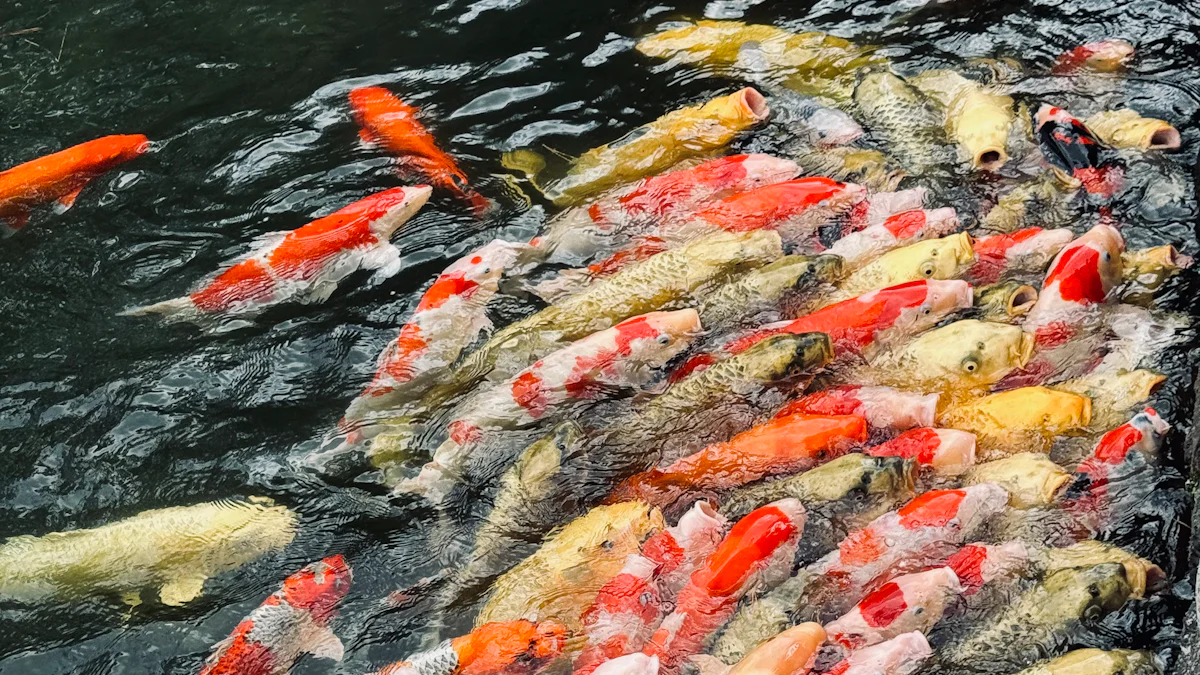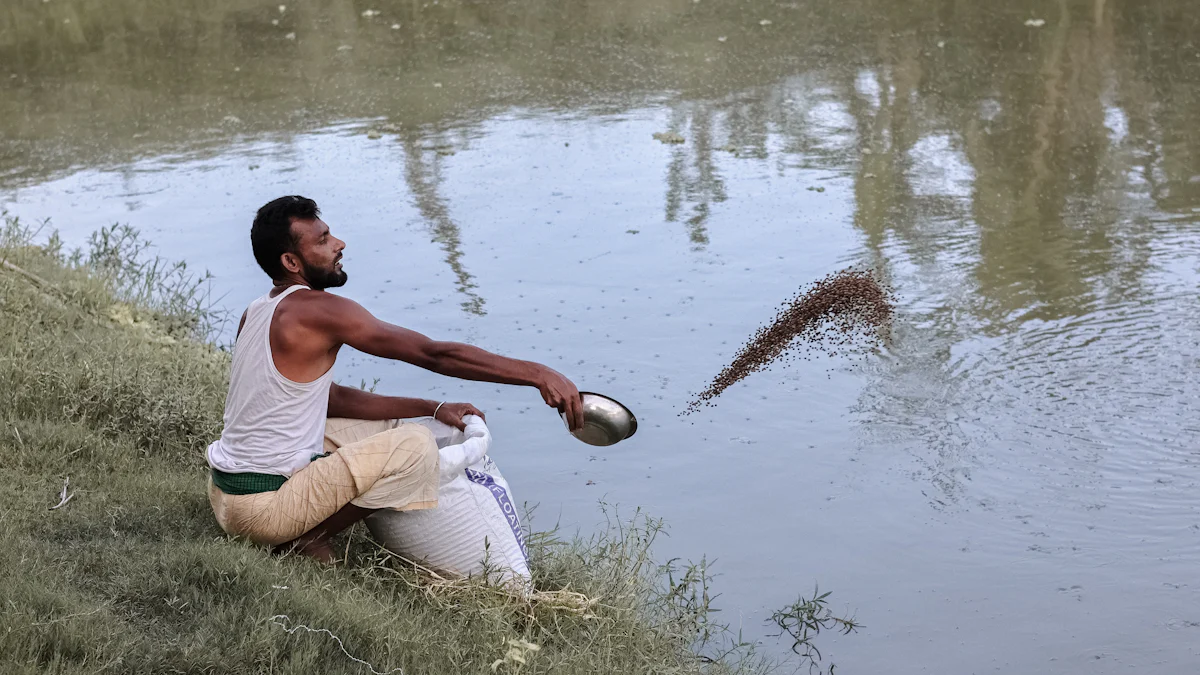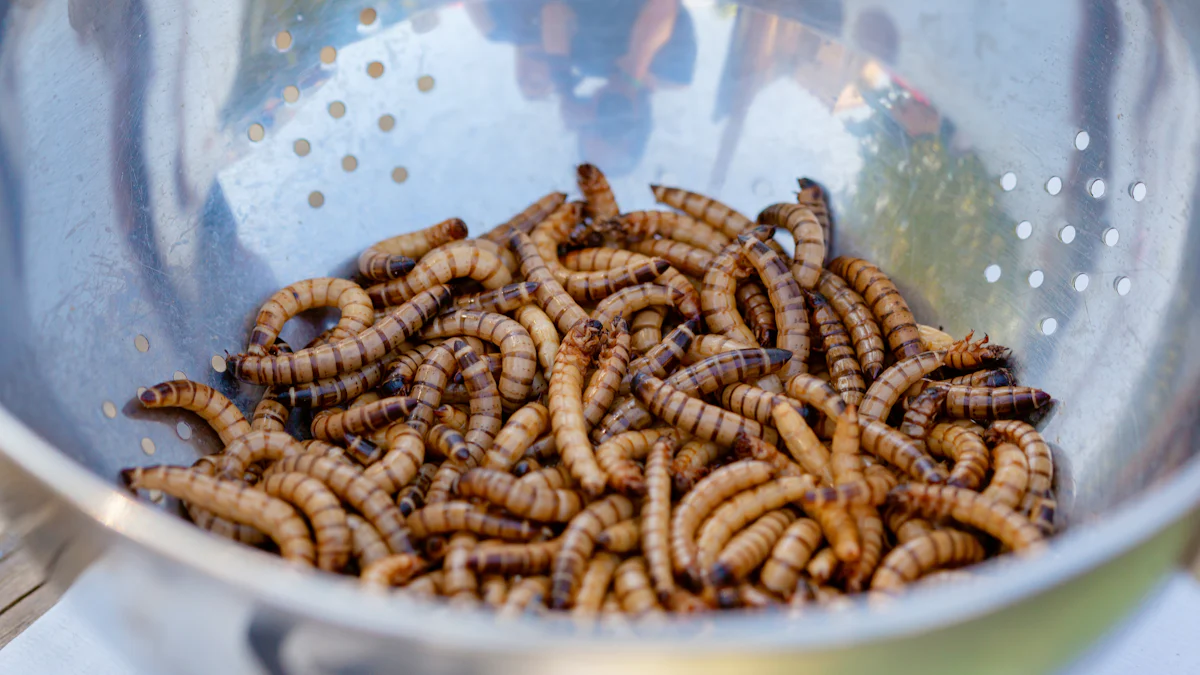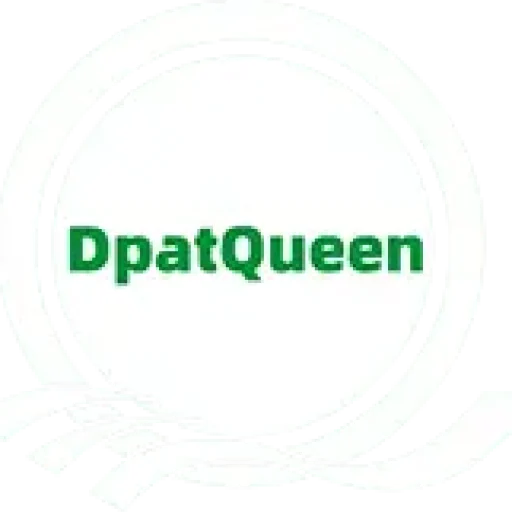
Imagine a serene pond, where pond fish glide gracefully through the water, searching for their next meal. In their natural habitat, pond fish feast on plankton, algae, insect larvae, and decaying plant matter. These foods provide essential nutrients for their growth and survival. Adding dried mealworms to their diet can be an excellent choice. Packed with about 50% protein, mealworms support growth and repair. Their fatty acids help maintain healthy fish scales, especially during colder months. When natural food sources become scarce, such as during seasonal transitions, dried mealworms provide a reliable, energy-rich alternative for pond fish.
Key Takeaways
- Dried mealworms are a high-protein food source for pond fish, containing about 50-60% protein, which supports growth and repair, especially during active seasons.
- To prevent choking hazards for smaller fish, always crush or soak dried mealworms before feeding, ensuring they are safe and digestible.
- Mealworms should complement a balanced diet; combine them with other foods like pellets and vegetables to provide a variety of essential nutrients for optimal fish health.
Nutritional Benefits of Pond Fish Mealworms

High Protein and Energy Content
Dried mealworms are a powerhouse of nutrition for pond fish. With a protein content of around 50-60%, they surpass many common fish foods in nutritional value. For comparison, dried mealworms contain 52.8% protein, while other fish foods typically have lower levels. This high protein content supports the growth and repair of fish tissue, making it especially beneficial during the active spring and summer months.
Mealworms also provide an impressive energy boost. Their 28% lipid content and energy density of 21,309 J/gram make them an excellent choice for fish preparing for colder seasons. The combination of protein and fat ensures that fish stay active and healthy, even when natural food sources are scarce. Additionally, mealworms mimic the nutritional profile of natural prey, which helps maintain the fish’s natural feeding instincts.
Essential Nutrients for Fish Health
Beyond protein and energy, dried mealworms offer a range of essential nutrients. They contain fatty acids that promote healthy skin and scales, which are vital for fish, especially in colder months when their immune systems may weaken. Vitamins like B12 and D, along with minerals such as calcium and phosphorus, contribute to bone growth, immune function, and overall vitality.
However, it’s worth noting that the tough exoskeleton of mealworms can pose a challenge for smaller fish or those with weaker jaws. Proper preparation, such as crushing or soaking the mealworms, can help make them more digestible and safer for all pond fish.
Suitable for Various Pond Fish Species
Pond fish mealworms are suitable for a wide range of species, including koi, goldfish, and other carnivorous or omnivorous fish. These species thrive on high-protein diets, and mealworms provide the perfect balance of nutrition and variety. The resemblance of mealworms to natural prey also stimulates hunting instincts, keeping fish engaged and active during feeding time.
Smaller fish, like neon tetras, may struggle with larger mealworms due to their size. In such cases, breaking the mealworms into smaller pieces ensures that all fish can enjoy this nutritious treat. Moderation is key, as mealworms should complement a balanced diet rather than replace it entirely.
Potential Risks of Feeding Pond Fish Mealworms
Overfeeding and Its Consequences
Feeding pond fish mealworms can be exciting, but overfeeding them can lead to several problems. When fish consume more food than they need, they may become overweight. This can make them less active and more prone to health issues. Uneaten mealworms often sink to the bottom of the pond, creating debris that dirties the water. Over time, this can cause cloudy water and promote algae growth. High ammonia levels from decaying food can also harm fish by affecting their gills and overall health.
To avoid these issues, pond owners should watch for signs of overfeeding, such as fat fish, leftover food, or murky water. Feeding small portions and observing how much the fish eat can help maintain a clean and healthy pond environment.
Choking Hazards for Smaller Fish
Dried mealworms are tough, which can make them difficult for smaller fish to eat. Their hard exoskeleton poses a choking risk, especially for fish with weaker jaws. Species like neon tetras or guppies may struggle to swallow whole mealworms. This can lead to digestive problems or even blockages.
To make mealworms safer, pond owners can crush or break them into smaller pieces. Soaking them in water before feeding also softens their texture, making them easier to chew and digest. These simple steps ensure that all fish, regardless of size, can enjoy this treat without any danger.
Risk of Nutritional Imbalance
While pond fish mealworms are nutritious, they shouldn’t replace a balanced diet. Feeding fish only mealworms can lead to nutritional imbalances. Fish need a variety of nutrients, including fiber, vitamins, and minerals, which mealworms alone cannot provide. A diet lacking in diversity may weaken their immune systems and slow their growth.
To keep fish healthy, mealworms should be part of a varied diet. Combining them with other foods like pellets, vegetables, or live insects ensures fish get all the nutrients they need. This approach supports their long-term health and vitality.
Feeding Guidelines for Pond Fish Mealworms

Appropriate Portion Sizes and Frequency
Feeding pond fish mealworms in the right amounts is crucial for their health. Overfeeding can lead to water pollution and fish obesity, while underfeeding may leave them malnourished. A good rule of thumb is to offer mealworms in small portions that fish can consume within a few minutes. For most pond fish, feeding once or twice a week is sufficient. This schedule prevents overfeeding and ensures mealworms remain a treat rather than a staple. Observing your fish during feeding can help you adjust portion sizes to suit their needs.
Preparing Mealworms for Safe Feeding
Proper preparation of mealworms makes them safer and more digestible for pond fish. Rehydrating freeze-dried mealworms in water for several minutes softens their tough exoskeleton, reducing choking risks. Freshly molted mealworms are another excellent option since they contain less chitin and are easier to digest. Gut-loading mealworms with nutritious food before feeding enhances their nutritional value, providing fish with essential vitamins and minerals. Additionally, choosing mealworms specifically made for fish ensures they are free from harmful additives. Drying and blanching techniques also improve the quality of mealworms by reducing microbial contamination and spoilage risks.
Combining Mealworms with a Balanced Diet
Mealworms are a fantastic source of protein and fat, but they should complement a varied diet. Combining them with fish flakes, pellets, or other protein sources like shrimp or earthworms ensures pond fish receive all the nutrients they need. For example, mealworms provide essential fatty acids and vitamins like B12 and D, while pellets often contain fiber and other minerals. Offering a mix of foods keeps fish healthy and prevents nutritional imbalances. Including mealworms as part of a diverse diet also stimulates natural feeding behaviors, keeping fish active and engaged.
Dried mealworms are a nutritious treat for pond fish when fed responsibly. They offer high protein, essential fatty acids, and vital nutrients like vitamins B12 and D. To ensure safety:
- Feed in moderation to avoid overfeeding.
- Soften mealworms for smaller fish.
- Combine with other foods for a balanced diet.
This approach promotes healthy, vibrant fish.
FAQ
Can dried mealworms replace all other fish food?
No, dried mealworms shouldn’t replace a balanced diet. Fish need a variety of nutrients from pellets, vegetables, and other protein sources to stay healthy.
How often should I feed dried mealworms to pond fish?
Feed dried mealworms once or twice a week. Offer small portions that fish can eat within a few minutes to prevent overfeeding and water pollution.
Are dried mealworms safe for baby fish?
Baby fish may struggle with dried mealworms due to their size and hardness. Crush or soak them to make them softer and easier for smaller fish to eat.


